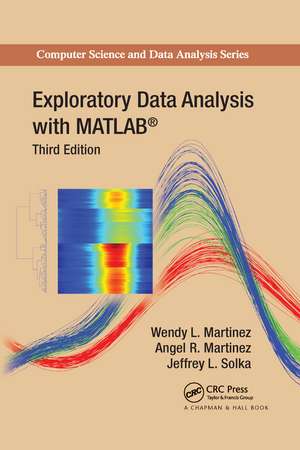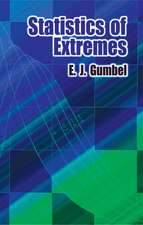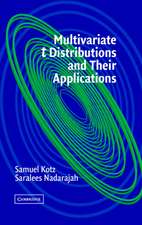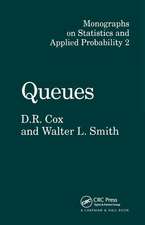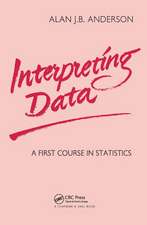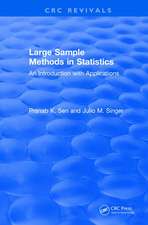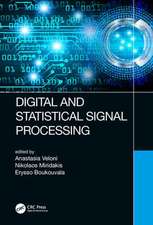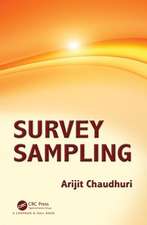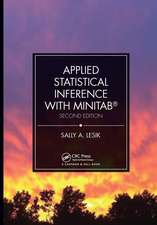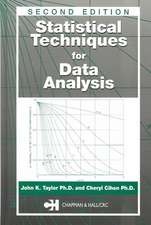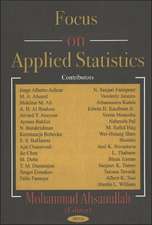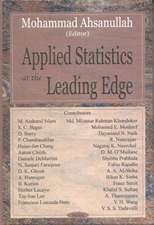Exploratory Data Analysis with MATLAB: Chapman & Hall/CRC Computer Science & Data Analysis
Autor Wendy L. Martinez, Angel R. Martinez, Jeffrey Solkaen Limba Engleză Paperback – 29 iul 2022
"The authors present an intuitive and easy-to-read book. … accompanied by many examples, proposed exercises, good references, and comprehensive appendices that initiate the reader unfamiliar with MATLAB."
—Adolfo Alvarez Pinto, International Statistical Review
"Practitioners of EDA who use MATLAB will want a copy of this book. … The authors have done a great service by bringing together so many EDA routines, but their main accomplishment in this dynamic text is providing the understanding and tools to do EDA.
—David A Huckaby, MAA Reviews
Exploratory Data Analysis (EDA) is an important part of the data analysis process. The methods presented in this text are ones that should be in the toolkit of every data scientist. As computational sophistication has increased and data sets have grown in size and complexity, EDA has become an even more important process for visualizing and summarizing data before making assumptions to generate hypotheses and models.
Exploratory Data Analysis with MATLAB, Third Edition presents EDA methods from a computational perspective and uses numerous examples and applications to show how the methods are used in practice. The authors use MATLAB code, pseudo-code, and algorithm descriptions to illustrate the concepts. The MATLAB code for examples, data sets, and the EDA Toolbox are available for download on the book’s website.
New to the Third Edition
- Random projections and estimating local intrinsic dimensionality
- Deep learning autoencoders and stochastic neighbor embedding
- Minimum spanning tree and additional cluster validity indices
- Kernel density estimation
- Plots for visualizing data distributions, such as beanplots and violin plots
- A chapter on visualizing categorical data
| Toate formatele și edițiile | Preț | Express |
|---|---|---|
| Paperback (1) | 356.64 lei 3-5 săpt. | +22.67 lei 4-10 zile |
| CRC Press – 29 iul 2022 | 356.64 lei 3-5 săpt. | +22.67 lei 4-10 zile |
| Hardback (1) | 689.47 lei 6-8 săpt. | |
| CRC Press – 27 iul 2017 | 689.47 lei 6-8 săpt. |
Din seria Chapman & Hall/CRC Computer Science & Data Analysis
-
 Preț: 436.36 lei
Preț: 436.36 lei - 18%
 Preț: 704.73 lei
Preț: 704.73 lei - 15%
 Preț: 674.03 lei
Preț: 674.03 lei -
 Preț: 370.85 lei
Preț: 370.85 lei -
 Preț: 430.17 lei
Preț: 430.17 lei - 12%
 Preț: 312.77 lei
Preț: 312.77 lei - 25%
 Preț: 427.84 lei
Preț: 427.84 lei - 20%
 Preț: 607.20 lei
Preț: 607.20 lei - 30%
 Preț: 288.69 lei
Preț: 288.69 lei -
 Preț: 386.88 lei
Preț: 386.88 lei - 15%
 Preț: 481.58 lei
Preț: 481.58 lei - 15%
 Preț: 485.98 lei
Preț: 485.98 lei - 22%
 Preț: 352.95 lei
Preț: 352.95 lei - 31%
 Preț: 265.29 lei
Preț: 265.29 lei - 20%
 Preț: 394.99 lei
Preț: 394.99 lei - 18%
 Preț: 1110.92 lei
Preț: 1110.92 lei - 20%
 Preț: 473.30 lei
Preț: 473.30 lei - 11%
 Preț: 305.52 lei
Preț: 305.52 lei - 25%
 Preț: 773.33 lei
Preț: 773.33 lei
Preț: 356.64 lei
Nou
Puncte Express: 535
Preț estimativ în valută:
68.26€ • 74.18$ • 57.38£
68.26€ • 74.18$ • 57.38£
Carte disponibilă
Livrare economică 31 martie-14 aprilie
Livrare express 14-20 martie pentru 32.66 lei
Preluare comenzi: 021 569.72.76
Specificații
ISBN-13: 9781032179056
ISBN-10: 1032179058
Pagini: 616
Ilustrații: 16 Illustrations, color; 84 Illustrations, black and white
Dimensiuni: 156 x 234 x 36 mm
Greutate: 0.45 kg
Ediția:3 ed
Editura: CRC Press
Colecția Chapman and Hall/CRC
Seria Chapman & Hall/CRC Computer Science & Data Analysis
ISBN-10: 1032179058
Pagini: 616
Ilustrații: 16 Illustrations, color; 84 Illustrations, black and white
Dimensiuni: 156 x 234 x 36 mm
Greutate: 0.45 kg
Ediția:3 ed
Editura: CRC Press
Colecția Chapman and Hall/CRC
Seria Chapman & Hall/CRC Computer Science & Data Analysis
Cuprins
Introduction to Exploratory Data Analysis. Dimensionality Reduction – Linear Methods. Dimensionality Reduction – Nonlinear Methods. Data Tours. Finding Clusters. Model-Based Clustering. Smoothing Scatterplots. Visualizing Clusters. Distribution Shapes. Multivariate Visualization. Appendices.
Descriere
This book describes the various methods used for exploratory data analysis with an emphasis on MATLAB implementation. It covers approaches for visualizing data, data tours and animations, clustering (or unsupervised learning), dimensionality reduction, and more. A set of graphical user interfaces allows users to apply the ideas to their own data.
